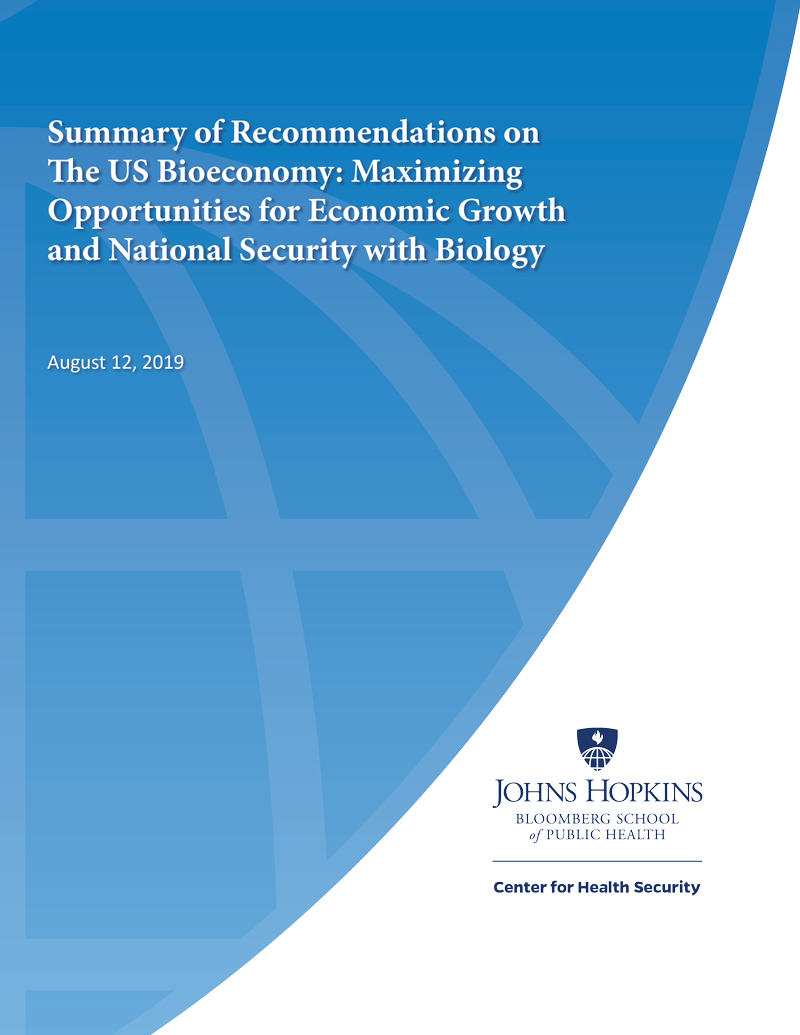Center for Health Security cosponsors meeting on maximizing opportunities for economic growth of the US bioeconomy
Center News

August 12, 2019 – Recently, the Johns Hopkins Center for Health Security and Gingko Bioworks convened key science, technical, academic, and industry experts for a meeting to solicit stakeholder input on specific ways that national policy can strengthen the US bioeconomy. Their recommendations are synthesized in a summary report, released today.
Participants considered the benefits to the US if its bioeconomy were to be expanded; examined the current health of the US bioeconomy; discussed existing US government programs, policies, and initiatives related to the bioeconomy; and identified priorities for strengthening the US bioeconomy.
The meeting, The US Bioeconomy: Maximizing Opportunities for Economic Growth and National Security with Biology, was held in Washington, DC, on July 16, 2019.
“The United States already hosts one of the world’s most competitive bioeconomy markets and is a leader in biological innovation and education,” Center authors explain in the summary meeting report. “However, recent advances in biological technologies are catalyzing global investment, spurring innovation, and increasing international competitiveness. As the growth or neglect of the US bioeconomy affects national security, it is critical for the US to actively develop new mechanisms that leverage advantages in biotechnology for its benefit in the face of greater peer competition.”
The meeting harnessed the collective advice of stakeholders to create a way forward for future public-private partnerships and policy approaches to enhance the benefits from a growing US bioeconomy.
Stakeholder consensus was not the goal of this convening; however, several key recommendations were made at the meeting:
- Government should move toward contracting mechanisms that emphasize cost savings across the enterprise, as well as factoring in nonmonetary benefits of biologically produced materials.
- Government should identify ways to recruit and retain talent needed to run innovative biotechnology research and development programs.
- The US government should initiate the tracking of data around the biotech workforce and company formation as these data compare to other countries.
- The US government should articulate a vision for its bioeconomy and coordinate its efforts to promote and protect the bioeconomy.
- The US government should consider strategic use of non-dilutive capital, matched by venture capital investments, to help drive the creation of key biotech companies that would be important to the US bioeconomy.
- The US government should work to clarify the uncertain regulatory pathway for novel synthetic biology products.
- If the US government were more explicit about what kinds of biotechnology-derived products it may need, the biotechnology industry could be more valuable to the government.
The growth of the bioeconomy should be a priority for the US, to take advantage of the benefits that biotechnology will bring across a variety of sectors and for continued national security. The US government leadership must embrace biotechnology and the bioeconomy as critical components of the US economy and invest accordingly.
The Center’s project team was led by Senior Scholar Gigi Gronvall, PhD, and included Analyst Lane Warmbrod, MS, MPH; Analyst Marc Trotochaud, MSPH; Deputy Director Anita Cicero, JD; and Center Director Tom Inglesby, MD.
About the Johns Hopkins Center for Health Security:
The Johns Hopkins Center for Health Security works to protect people from epidemics and disasters and build resilient communities through innovative scholarship, engagement, and research that strengthens the organizations, systems, policies, and programs essential to preventing and responding to public health crises. The Center is part of the Johns Hopkins Bloomberg School of Public Health and is located in Baltimore, MD.
About Gingko Bioworks:
Ginkgo Bioworks is the organism company, using the power of biology to build sustainable products in food, pharma, manufacturing, and more. Using sophisticated software and state of the art automation, Ginkgo's powerful platform for genetic engineering is making biology easier to engineer, enabling new products to be renewably manufactured with biology.
